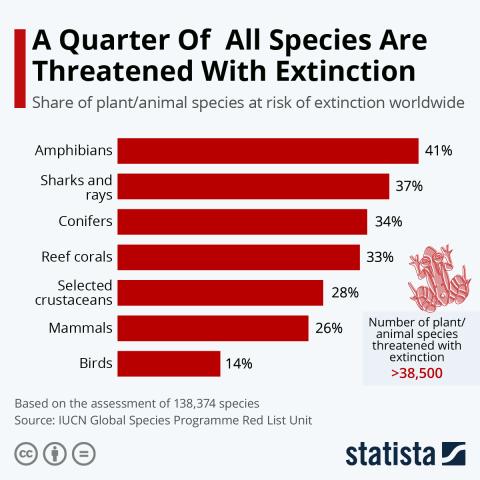Submitted by ICConline on
The state of the planet is catastrophic. The climate is warming faster than any scientific forecast, causing fires, droughts, storms, floods... The oceans are acidifying, and with them the rainfall; vegetation under water or on land is suffering the disastrous consequences. Worldwide deforestation is breaking records every year, and asphalt is covering more and more land. Pollution contaminates everything: greenhouse gases, pesticides in the soil, plastic particles in the seas, pharmaceutical molecules in rivers.... to the point where fish doped with oestrogen are changing sex!
The direct consequence of human activity is devastating: 26,000 species disappear every year. More and more researchers are anticipating the sixth wave of mass extinction (the previous one, the fifth, being that of the dinosaurs, 66 million years ago). “If bees disappeared from the face of the earth, man would only have four years to live”. Although Einstein never actually uttered this sentence, the powerful idea is nonetheless true: insects feed the world (birds, reptiles, mammals, plants) and pollinate 75% of crops and 80% of wild plants. Their gradual disappearance is a direct threat to natural ecosystems and humanity's ability to feed itself.
The human species is already suffering massively from this destruction of the planet. Every year, ‘natural’ disasters linked to global warming force tens of millions of people into exile; air pollution causes millions of ‘premature’ deaths, and over two billion human beings are tortured by a lack of water. The Covid 19 pandemic, which according to the World Health Organisation killed 7 million people between 2019 and 2021 (15.9 million according to demographers), and which has reduced global life expectancy by a year and a half, is also partly to the ecological crisis. This pandemic has highlighted the link between the destruction of nature and the threat to human health. According to the Intergovernmental Science-Policy Platform on Biodiversity and Ecosystem Services (IPBES), 70% of emerging diseases (Zika, Ebola, Nipah, etc.) and almost all known pandemics (e.g. influenza, HIV, Covid-19) originate from zoonoses (diseases caused by infections of animal origin). The underlying causes of these pandemics are the same as those that ravage nature: deforestation and destruction of natural ecosystems, trade in and consumption of wild species, etc.
In 2009, an international team of twenty-eight researchers led by Johan Rockström, a world-renowned Swedish scientist, established nine ‘planetary limits’ that humanity should not exceed if it is not to compromise the conditions for its survival:
1. Climate change
2. Erosion of biodiversity
3. Disruption of the biogeochemical cycles of nitrogen and phosphorus
4. Changes in land use
5. Ocean acidification.
6. Global water use
7. Depletion of the ozone laye.
8. The introduction of new entities into the environment (heavy metals, synthetic and radioactive compounds…)
9. And the concentration of aerosols in the atmosphere.
Six of these nine “planetary limits” have already been exceeded (and two of them cannot be measured). The scale of the disaster underway is such that the Davos Forum itself is forced to acknowledge that "The loss of biodiversity and the collapse of ecosystems is considered to be one of the most rapidly deteriorating global risks of the next decade (...) The combination of extreme weather events and limited supplies could transform the current cost of living crisis into a catastrophic scenario of hunger and distress for millions of people (...).The interaction between the effects of climate change, biodiversity loss, food security and the consumption of natural resources will accelerate the collapse of ecosystems”.
It is not life on earth as such that is at stake. It has already been able to develop in much more hostile conditions, to recover after waves of mass extinction that were even more extensive than today; life can be found at the bottom of the oceans, under the earth, on every surface. No, what is threatened is the human species. The way society works today will eventually make the earth uninhabitable for humanity.
All the ‘solutions’ to the ecological crisis proposed by the ruling class are futile because the problems we face are built into the global system that dominates the planet –the capitalist system, which lives through exploitation and the hunt for profit. Exploitation of human labour power through the wage relation; exploitation of nature, which it regards as a free gift to be plundered at will. And although capitalism has produced the scientific and technological means which could be used to free humanity from poverty and alienated labour, the clash between this productive potential and the very motivation for production has become permanent. Capitalism has been an obsolete, decadent form of society for over a hundred years. This long decline has now reached a terminal phase, a dead-end in which war, crises of overproduction and ecological destruction have reached the point at which all these manifestations of the impasse are acting on each other to produce a terrible whirlwind of destruction. But there is an alternative to the nightmare being realised by capitalism: the international struggle of the exploited class for the overthrow of capitalism and the construction of a world communist society.







 del.icio.us
del.icio.us Digg
Digg Newskicks
Newskicks Ping This!
Ping This! Favorite on Technorati
Favorite on Technorati Blinklist
Blinklist Furl
Furl Mister Wong
Mister Wong Mixx
Mixx Newsvine
Newsvine StumbleUpon
StumbleUpon Viadeo
Viadeo Icerocket
Icerocket Yahoo
Yahoo identi.ca
identi.ca Google+
Google+ Reddit
Reddit SlashDot
SlashDot Twitter
Twitter Box
Box Diigo
Diigo Facebook
Facebook Google
Google LinkedIn
LinkedIn MySpace
MySpace